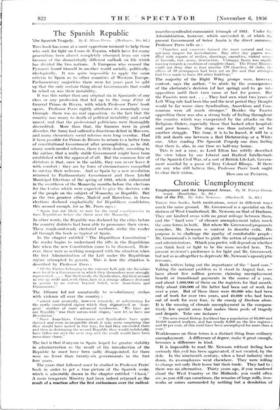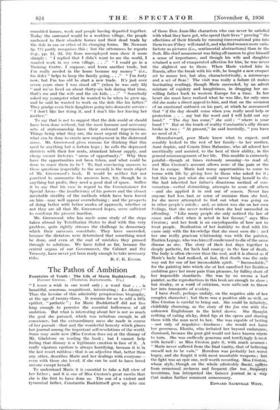Chronic Unemployment
Out of the Pit. By John Newsom. (Blackwell. 3s. 6d.) THESE two books, both meritorious, cover in different ways much the same ground. Mr. Greenwood is a specialist on the distress of West Cumberland, Mr. Newsom on that of Durham: They are kindred areas with no great mileage between them,
and the " hard core " of chronic unemployment takes 'much the same forms in both. But where Mr: Greenwood propounds remedies, Mr. Newsom is content to describe • evils; His purpose is' to challenge the apathy of comfortable people ; Mr. Greenwood's is rather to guide the action of sympathisers and administrators. Which you prefer, will depend on whether you think heat or light to be the More needed here. The present reviewer's preference is for light and Mr. Greenwood, but not so as altogether to deprecate Mr. Newsont's apocalyptic fervours.
Both writers bring out the importance of the " hard core." Taking the national problem as it stood in August, last, we have about five million persons claiming unemployment benefit or transitional payments in the .course of a year, and about 1,600,000 of them on the registers for that month. Only about 340,000 of the latter had been out of work for over a year. But of these there were 60,000 who had been out of work for over two years, and 40,000 who had been out of work for, over, four, in the county of Durham alone. It is the massing of chronic unemployment in the compara- tively few special areas that makes them pools of tragedy
and despair. Take one instance :
" The area round Bishop Auckland has a population of 63,000 and 10,000 insured workers, and has nearly 6,000 on the live register ; and 80 per cent. of this total have been uneinpluyed for more than a year."-
Worklessness on these terms is a distinct thing from ordinary unemployment. Aaliffereneeof degree; make it great enough, becomes a difference its kind.-' - - It is impossible to_ read_.Mr. _Newsom _without feeling-how seriously.thisevil-has-been aggravated, if not created, by the dole. In the nineteenth century, when a local industry shut down, its ex-employees -went -elsewhere: They -were willing to change not-only their home but their trade. They had to ; there was no alternative. Thirty years ago, if-you wandered
about the West Country 'or. the Midlands, you could often see„as e•ou still l'he -remains of large mills, iron-
works or mines surrounded by nothing but a desolation of
crumbled homes, work and people having departed together. Today the surround would. be a workless village, the people anchored to their obsolete homes and their dead trade by the dole in one or other of its changing forms. Mr. Newsom (p. 77) partly recognises this ; but the utterances he reports (e.g., pp. 21, 22, 24) from unemployed men show it more sharply : " I replied that I didn't want to see the world, I wanted work in my own village. . . ." " I could go in a Training Centre, I suppose, and learn another trade, but I'm really needed in the home because my money " (i.e., his dole) " helps to keep the family going. . . ." " I'm forty now, but I'm too old to start a new trade. It's just over seven years since I was stood off " (when he was only 33) and we've lived on about thirty-six bob during that time, that's me and the wife and the six kids. . . ." " Somebody asked my youngster what he wanted to be when he grew up, and he said he wanted to work on the dole like his father." They grudge even their daughters going into domestic service :
I don't like her doing it, and I don't like her leaving her mother."
To say that is not- to suggest that the dole could or should have been done without, but the most humane and necessary acts of statesmanship have their awkward repercussions. Things being what they are; the most urgent thing is to see what can be done to create new employment in the distressed areas. Mr. Greenwood gives reasons for thinking that this need be anything but a forlorn hope ; he calls the depressed districts with their low rents, abundant labour supply, and cheap vacant factories " areas of opportunity." Why then have the opportunities- not been taken; and what could be done to cause them to be ? To, find convincing answers to these questions (especially to the second) is -the main object of Mr. Greenwood's book. It would be neither fair nor practical to summarise his answers here, for, though he is anything but prolix, they need a good deal of space. Suffice it to say that his case in regard to the Commissioner for Special Areas—the insufficiency of his powers and the almost inevitable sterility of the- methods which have been forced on him—may well appear overwhelming ; and the prospects of doing better with better modes of approach, whether or not they are all that Mr. Greenwood hopes, seem sufficient to condemn the present inaction.
Mr. Greenwood, who has made some study of the steps taken abroad by Totalitarian States to deal with this very problem, quite rightly stresses the challenge to democracy which their successes constitute. They have succeeded, because- the dictators were determined that something must be done, and even at the cost of mistakes they pressed through to solutions. We have failed so far, because the central organs of our Government, the Cabinet and the Treasury, have never yet been ready enough to take necessary















































 Previous page
Previous page